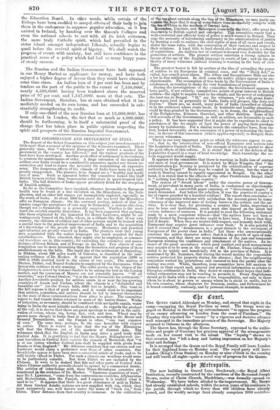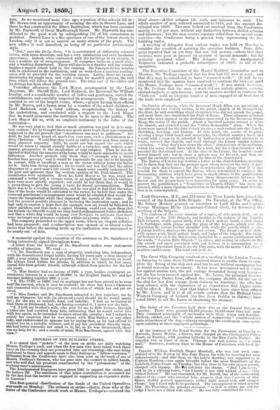hr Vrtrupulto.
The new building in Gravel Lane, Southwark,—the Royal Albert Institution, recently constructed by the exertions of the Reverend Joseph Brown, rector of Christ Church, Blackfriars —was formally opened on Wednesday. We have before alluded to the improvement. Mr. Brown had already established schools, within the seven years of his residence in the parish, through which no fewer than 400 children have already passed, and the weekly savings fund already comprises 2000 contriba- tors. As we mentioned some time ago, a portion of the schools fell in ; Mr. Brown took an opportunity of securing the site in Gravel Lane, and there he has constructed the Albert Institution, which has been executed by Mr. Papworth of Great Marlborough Street. Mr. Papworth has con- tributed to the good work by relinquishing 751. of his commission as architect. Gravel Lane is a fine specimen of one of the lowest streets in London only it is not so narrow as many streets of' the grade. The new edifice is well described, as being of no particular architectural style.
"But," says the Daily Yews, "it is constructed of differently coloured bricks, with atone dressings, and has a very substantial and even handsome appearance. Indeed, when contrasted with the buildings in its vicinity, it has a positive air of sumptuousness. It comprises baths on a small scale, and a washing department. There will also be in it Sunday and day schools, besides a ragged school held in the evening. On Sundays divine worship will be celebrated in the institution, and on week-days a spacious reading- room will be provided for the working classes. Lastly, there are twenty dormitories for single men, and eight rooms for married persons, the rent from which will defray the ground-rent. The total cost of the edifice and its fittings has been about 20001.
Yesterday afternoon the Lord Mayor, accompanied by the Lady Mayoress, Mr. Sheriff Hale, Lord Radstack, the Reverend Sir William Dunbar, and a considerable number of ladies and gentlemen, visited the establishment, and carefully inspected its arrangements. They then as- sembled in one of the largest rooms, where,,—prayer having been offered by Mr. Brown, and a hymn sung by a number of the school children,— Lord Radstock read a brief address, recapitulating the history of the undertaking, and concluded with a request to the Lord Mayor that he would pronounce the institution to be open to the public. The Lord Mayor did so, with an emphatic testimony to the value of the institution— He was very glad to find that so much attention was paid in it to sani- tary matters ; for he thought there was much more truth than was commonly supposed in the old proverb that "cleanliness was next to godliness." In- deed, ho had never heard of, much less ever seen, such a phenomenon as a dirty Christian. Would that they could as easily cleanse men from moral as from physical impurity. Still, he could not but regard the care which would be taken to impart cleanly habits as a valuable, and, indeed, a ne- cessary, preparative to the inculcation of true religion. Then he was de- lighted to find that the inmates of the home would be made amenable to moral influences. Another proverb told them that—" example was a better teacher than precept," and it would be impossible for any one to be brought in contact; with so excellent a man as the rector without being the better for it. Give him living epistles; for he could not but feel that the silent eloquence of a good man's life would be much more readily understood by the poor and ignorant than the written epistles of St. Paul himself. The dormitories were admirable. Even he, Lord Mayor as he was, mould not command a better bed, a cleaner room, or an apartment in which sanitary laws were more strictly regarded; nor could he but think that it would be a great thing to give the young a taste for decent accommodation. Then there was to be a reading institution, and he was glad to find that the selec- tion of the books would be entrusted to the rector, for he felt that under the reverend gentleman's management none would be admitted that would fas- cinate the imagination while they depraved the morals of the reader. He i had the greatest possible pleasure in declaring the institution open ; and he had only to express a hope that the example now set would-be followed by other parishes, and that such a signal blessing would rest upon them that his friends the Sheriffs would ere long find theirlunpleasanrduties abolished, and that a white flag would be hung over Newgate to intimate that there were no longer any prisoners confined within its gloomy walls. (Cheers.)
The company proceeded to the upper room, where an elegant collation had been prepared ; and a subscription was opened of so liberal a cha- racter that before the meeting broke up the institution was announced to be nearly out of debt.
A.memorial against the execution of the sentence on Dr. Smethurst is being extensively signed throughout town.
A letter- from the brother of Dr. Smethurst makes some statements worthy of attention. We read:—
"1. Dr. Smethurst was a man of property, rendering him independent, with his domesticated frugal habits, having for years past a clear income of 2401. a year arising from fixed property, besides a few hundreds in hand. He always lived within his income, in addition to which he had many casual fees from private friends, although retired from practice for the last six years.
"2. Miss Bankes had an income of 2401. a year, besides contingent re- versionary interest in a sum of 10,0001. in the English funds, his and her incomes making-together 4801. a year. "'3. The 17401. or 18001. lent on mortgage has not been proved to be even half the amount, when it may be realized ; for there has been a Chancery suit connected with this property, the conclusion of which has not yet ar- rived.
"4. Miss Bankes and Dr. Smethurst intended to live together ; for he told me whenever his wife (in advanced years) should die he would marry her; for she was so amiable, kind, and ladylike. I had an invitation to visit them at Richmond, but, not having accepted it, I never saw the lady. "5. I told my brother's wife, who sent for me to Rifle Terrace, through a letter she had received from him, intimating that he would never live with her again, as he intended ta move about the country ; but I refused to satisfy her suspicion that he was absent with Miss Bankes or any other lady, and endeavoured to appease her by saying that, as he had offered to support her in a suitable manner, and to pay her periodical friendly visits, she had better reconcile her mind to it, for, as he was determined, there was no help for it ; and a cousin of mine, Miss Smethurst, agreed with this view."



























 Previous page
Previous page